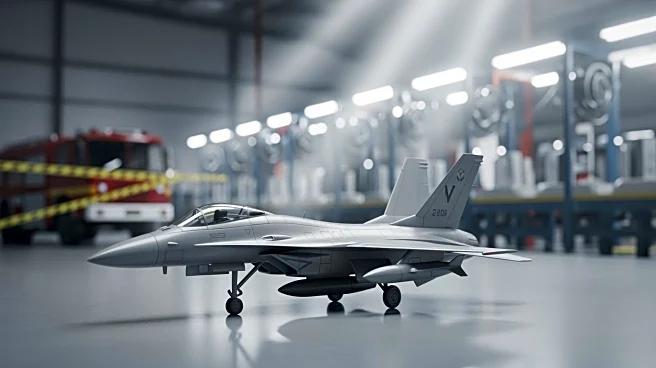What's Happening?
Workers at Boeing Defense in the St. Louis area have rejected the company's latest contract proposal, prolonging a strike that has already delayed the delivery of fighter jets and other programs into its 13th week. The strike involves approximately 3,200
members of the International Association of Machinists and Aerospace Workers (IAM) District 837. Union leadership expressed dissatisfaction with Boeing's offer, stating that it failed to address the needs of the workers. The rejected five-year offer was similar to previous proposals that union members had turned down. Boeing has maintained that it will not significantly improve its offer, despite the ongoing strike. The IAM had previously approved a four-year contract proposal, which Boeing management has refused to consider. The strike has notably delayed deliveries of F-15EX fighters to the U.S. Air Force.
Why It's Important?
The prolonged strike at Boeing Defense is significant as it impacts the delivery of critical military aircraft, such as the F-15EX fighters, which are essential for U.S. national security. The delay in deliveries could affect military readiness and operational capabilities. Additionally, the strike highlights ongoing labor disputes within major defense contractors, which could influence future negotiations and labor relations in the industry. Boeing's refusal to improve its offer may lead to further disruptions and financial losses, as the company is expected to report another unprofitable quarter. The situation underscores the tension between corporate management and labor unions, with potential implications for worker rights and compensation in the aerospace sector.
What's Next?
Boeing is expected to report its third-quarter results soon, which may include a multi-billion dollar charge on its 777X program, further complicating its financial situation. The ongoing strike could lead to increased pressure on Boeing to negotiate a fair deal with the union, as continued delays in fighter jet deliveries may attract scrutiny from military and government stakeholders. The IAM may continue to push for better terms, leveraging the impact of the strike on Boeing's operations. The outcome of the strike could set a precedent for future labor negotiations within the aerospace industry, potentially influencing how companies address worker demands and contract disputes.
Beyond the Headlines
The strike at Boeing Defense raises broader questions about labor rights and corporate responsibility in the defense industry. It highlights the ethical considerations of balancing profit margins with fair compensation for workers who contribute to national security. The situation may prompt discussions on the role of unions in advocating for worker rights and the importance of equitable labor practices in maintaining a skilled workforce. Additionally, the strike could influence public perception of Boeing and its commitment to its employees, potentially affecting its reputation and stakeholder relationships.















